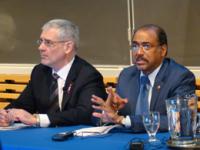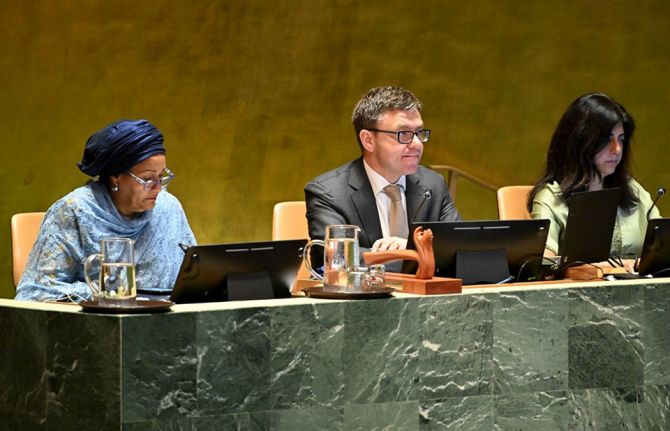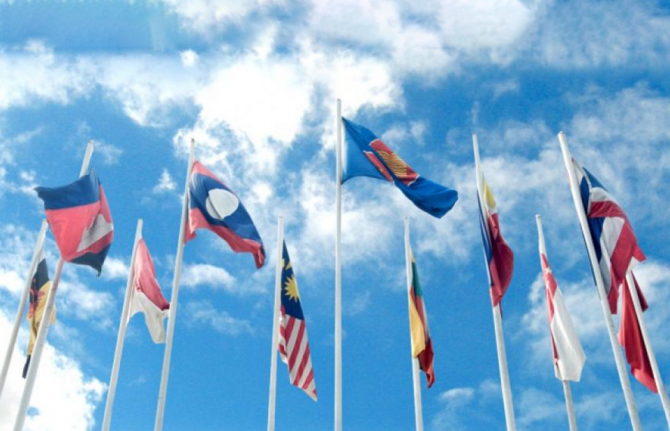
Feature Story
During Winter Olympics, UNAIDS calls on Canada to ensure G8 delivers on universal access
28 February 2010
28 February 2010 28 February 2010
(from left) Dr Julio Montaner, Director of the British Columbia Centre for Excellence in HIV/AIDS and President of the International AIDS Society; Michel Sidibé, UNAIDS Executive Director. Vancouver, 26 February 2010.
Credit: UNAIDS
A global summit on HIV was hosted by LifeSciences British Columbia, the BC Centre of Excellence in HIV/AIDS, and the University of British Columbia (UBC) on 26 February against the backdrop of the 2010 Olympic Games. Endorsed by the International AIDS Society, the event "The Impact of Science & Innovation in the Evolving Global Health Paradigm: HIV and AIDS - A Challenge of Olympic Proportion" brought together world leaders in HIV research, health, innovation and policy to share latest and compelling perspectives on the challenges being faced under a shifting global health paradigm.
During the international summit, UNAIDS Executive Michel Sidibé called on the Prime Minister of Canada to ensure that the G8 delivers on its commitment to universal access to HIV prevention, treatment, care and support. “As the host [of this year’s G8 Summit], Prime Minister Stephen Harper can set a bold agenda for the summit.”
As the host of this year’s G8 Summit, Prime Minister Stephen Harper can set a bold agenda. The G8 has a moral obligation to ensure their commitment to universal access is fulfilled
UNAIDS Executive Director Michel Sidibé
“The G8 commitment to universal access must be fulfilled. For tens of millions of people, please do not allow their hope for universal access to be transformed into a universal nightmare.”
Dr Stefano Bertozzi, the recently appointed HIV Director of the Bill and Melinda Gates Foundation, described the impact of the global financial crisis on funding for AIDS. “The slowdown of global funding for HIV risks backsliding in the continued scale-up of HIV treatment.”
Bertozzi described the financial crisis as an important opportunity to improve the efficiency of HIV programmes, which can also be used to improve the performance of health systems. He called on using treatment more creatively and effectively to serve the goals of both prevention and treatment. “Comprehensive combination prevention presents the ideal marriage of treatment and prevention.”
During these impressive Olympics in Vancouver, we are working towards our common goal of a world without HIV”
Tommy Sithole, Director of International Cooperation, International Olympics Committee
This meeting was organized by Dr Julio Montaner, Director of the British Columbia Centre for Excellence in HIV/AIDS and President of the International AIDS Society. Dr Montaner described British Columbia’s ambitious $48 million pilot programme to send health-care workers onto the streets of Vancouver to diagnose and treat hard-to-reach populations such as people who inject drugs, using early treatment as an aggressive form of prevention. The programme, called “Seek and Treat”, will improve access to treatment to the populations that are still disproportionately affected by HIV in Vancouver.
The meeting also featured a message from the International Olympic Committee (IOC) about its innovative HIV campaign during the 2010 Vancouver Winter Olympics. Tommy Sithole, Director of International Cooperation for the IOC, cited the IOC’s partnership with UNAIDS as an example of how the Olympics can be used to highlight information about HIV. “The IOC can reach out on your behalf to the billions of people around the world that follow the Olympics. During these impressive Olympics in Vancouver, we are working towards our common goal of a world without HIV.”
During Winter Olympics, UNAIDS calls on Canada to
Press centre:
World Leaders in HIV/AIDS to convene in Vancouver during 2010 Olympic Games (23 February 2010)
Speeches:
Read UNAIDS Executive Director speech to international summit on the impact of science on HIV (26 February 2010)



